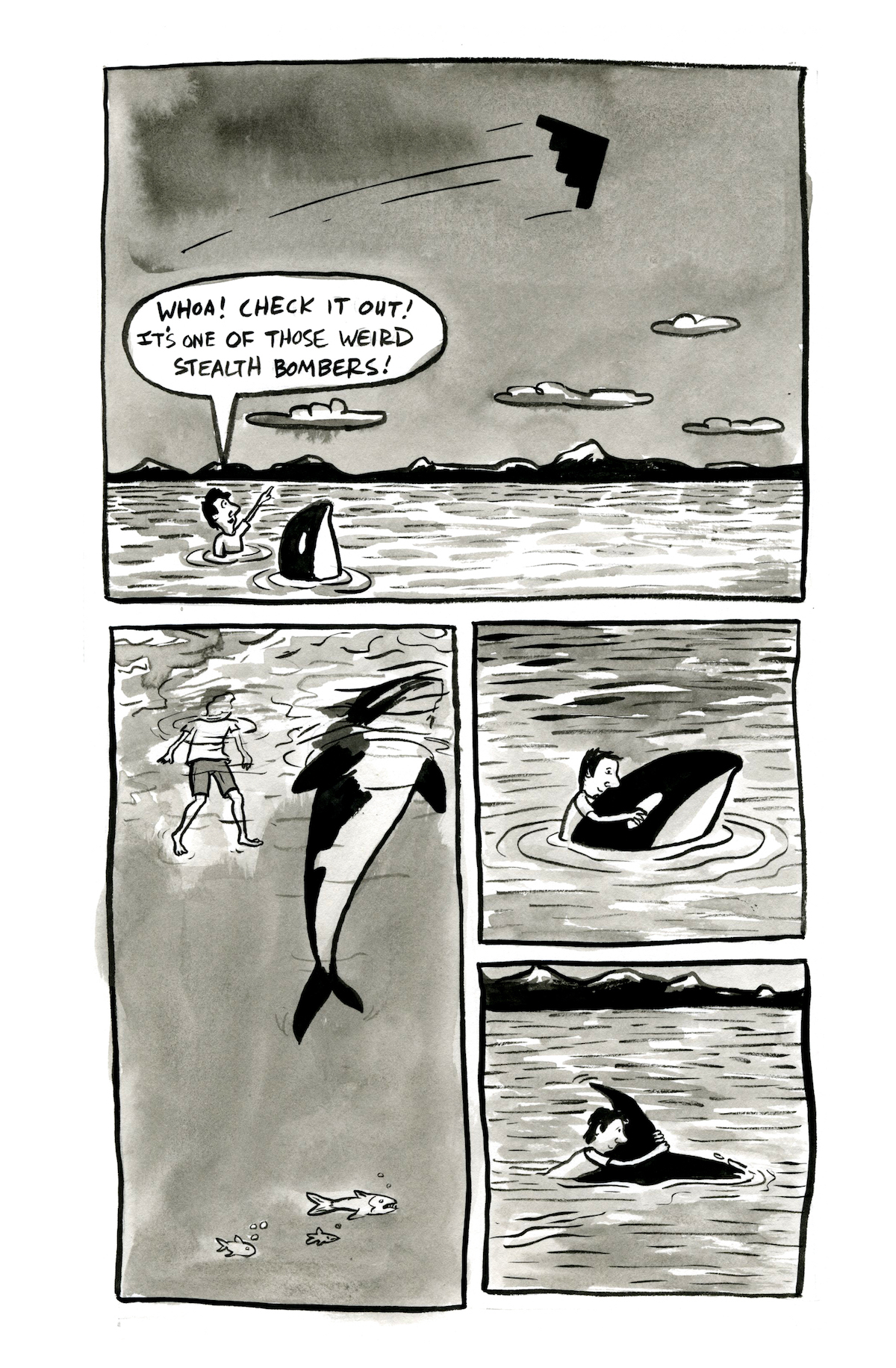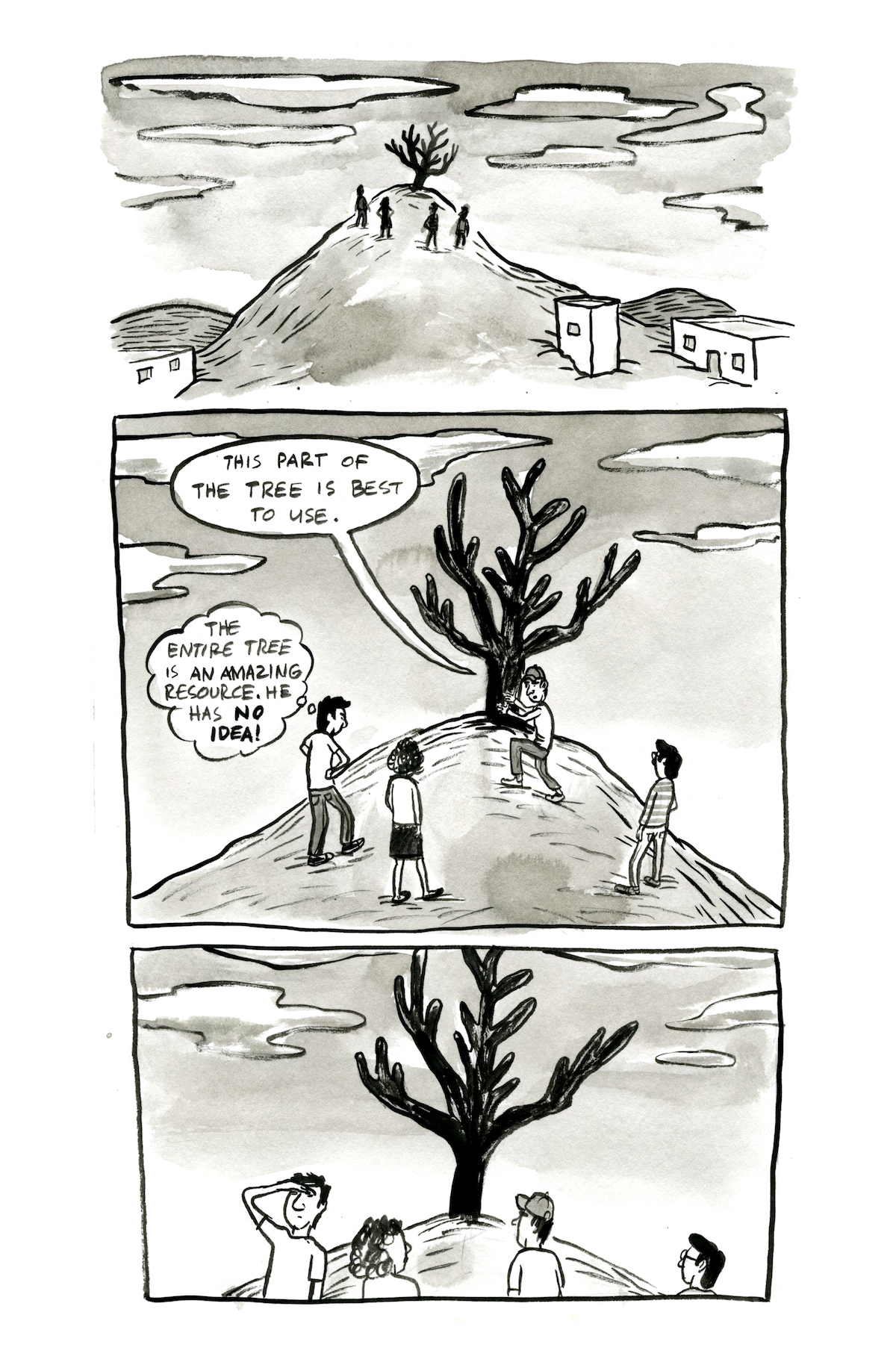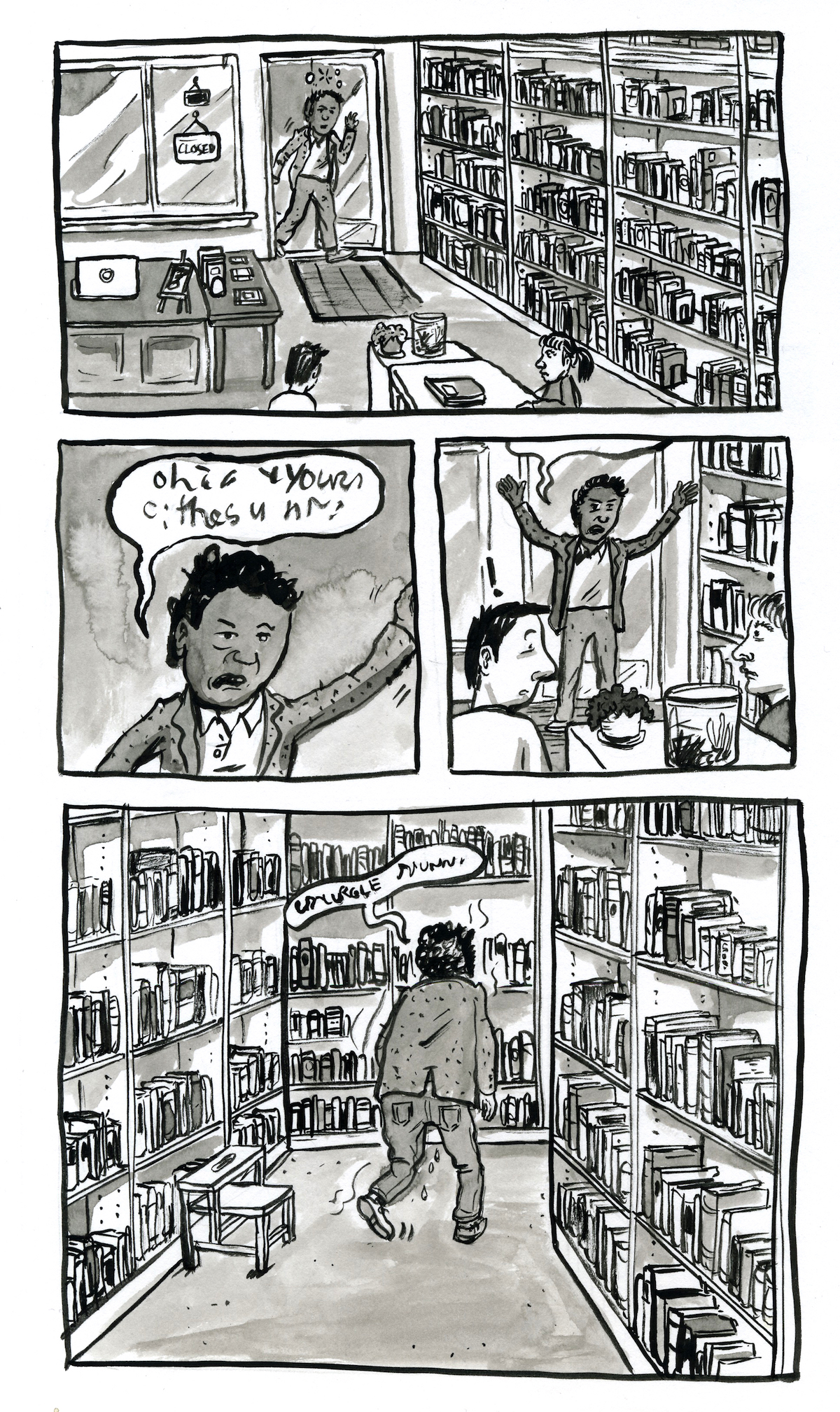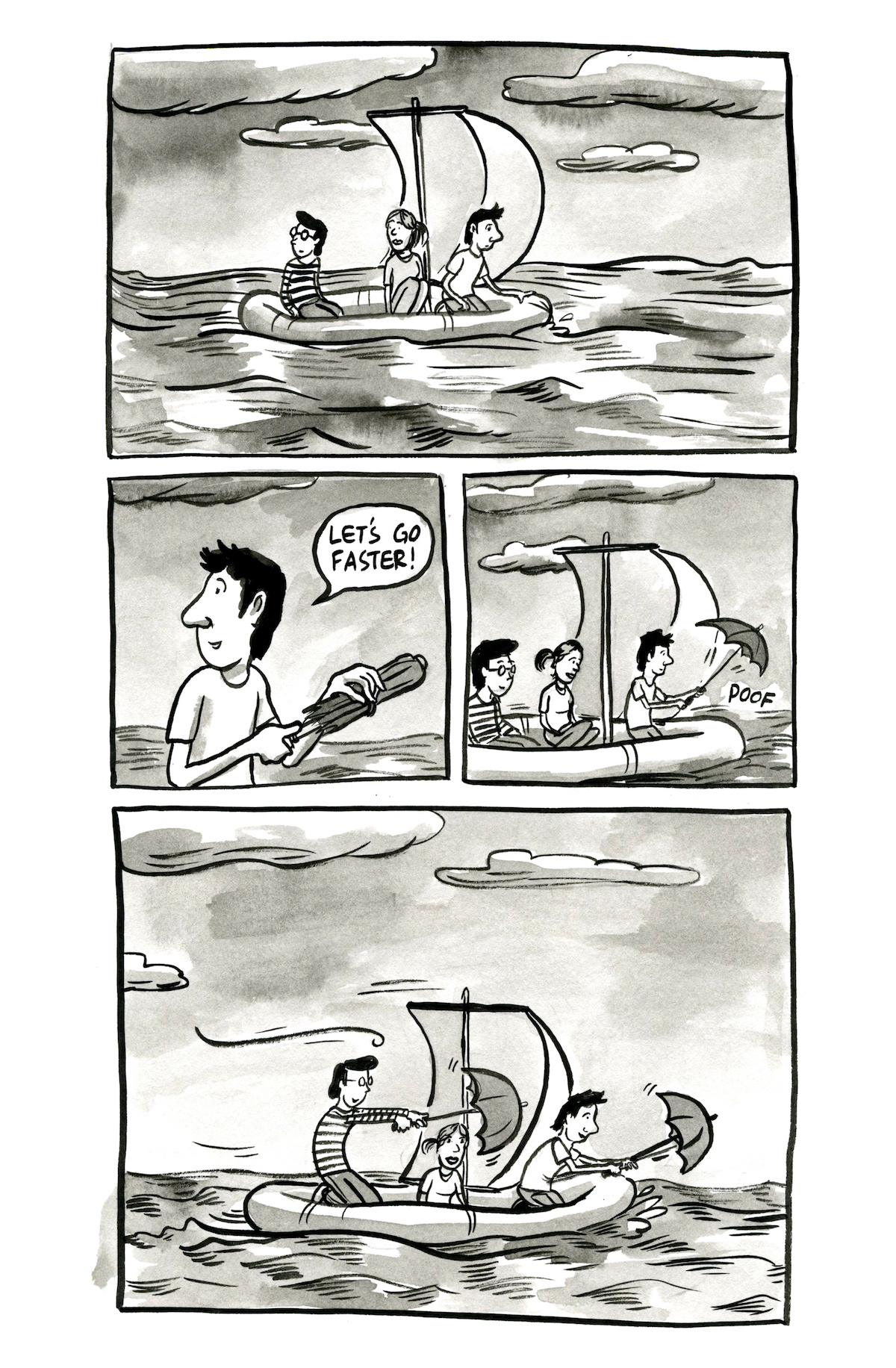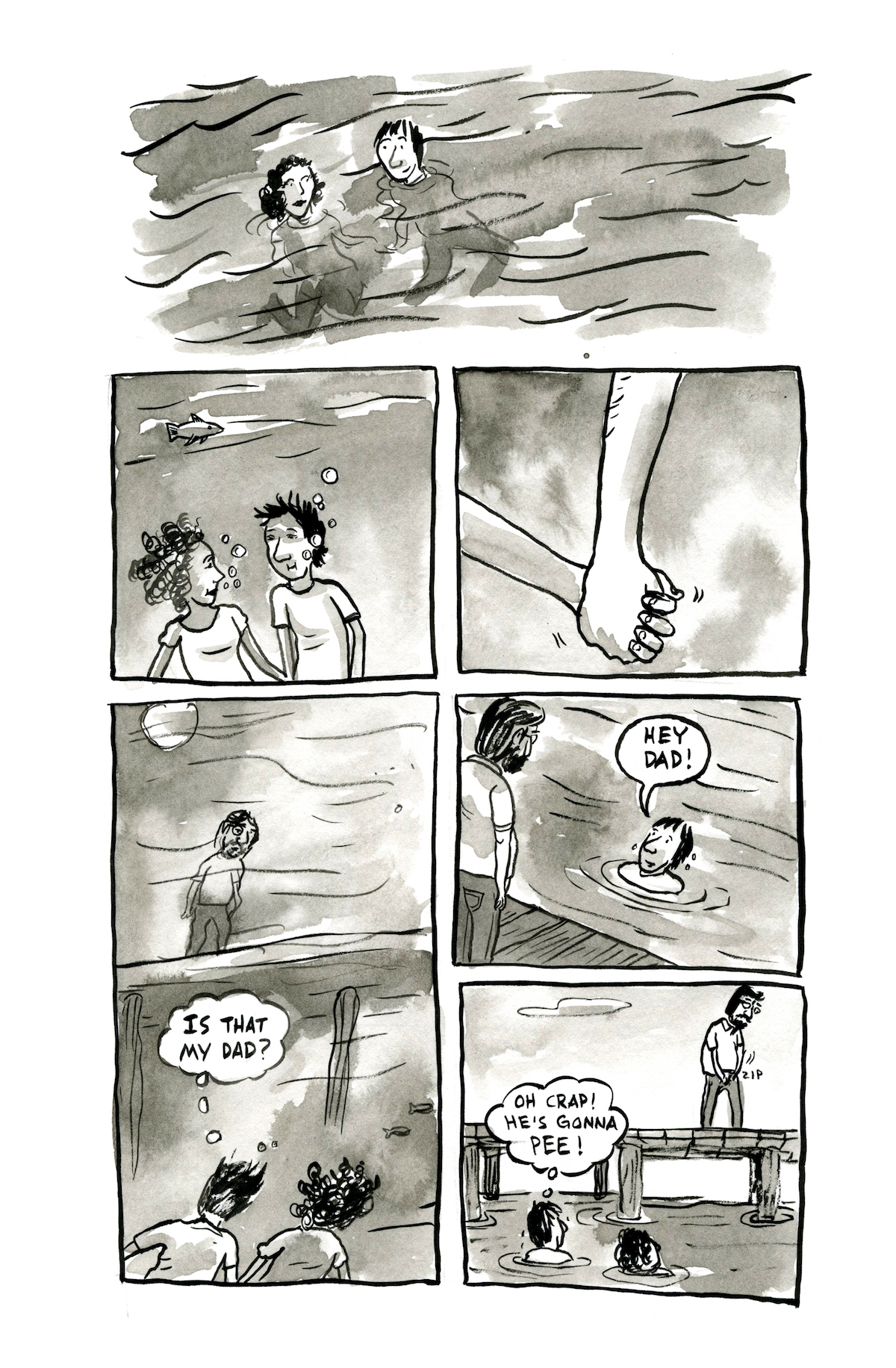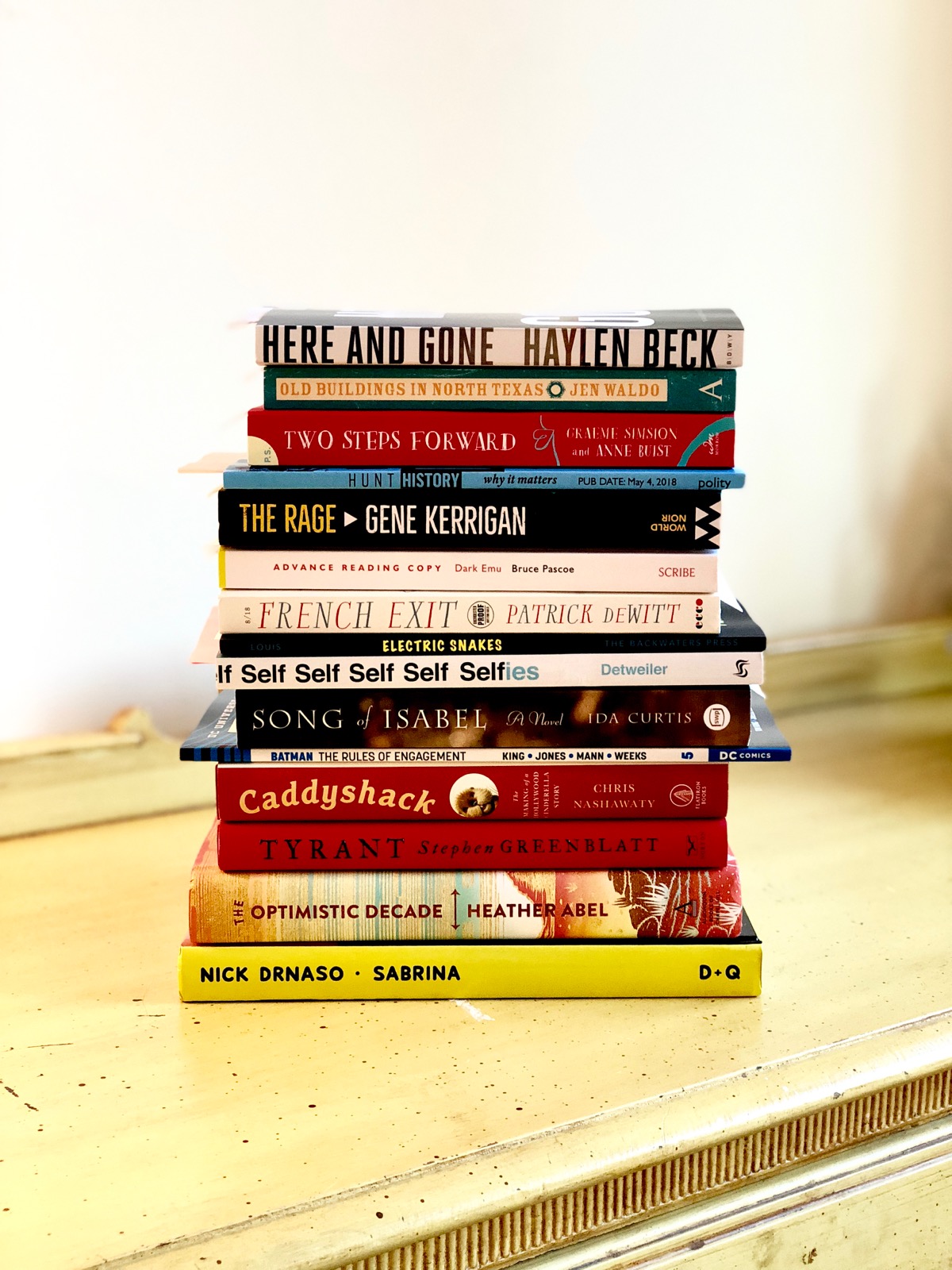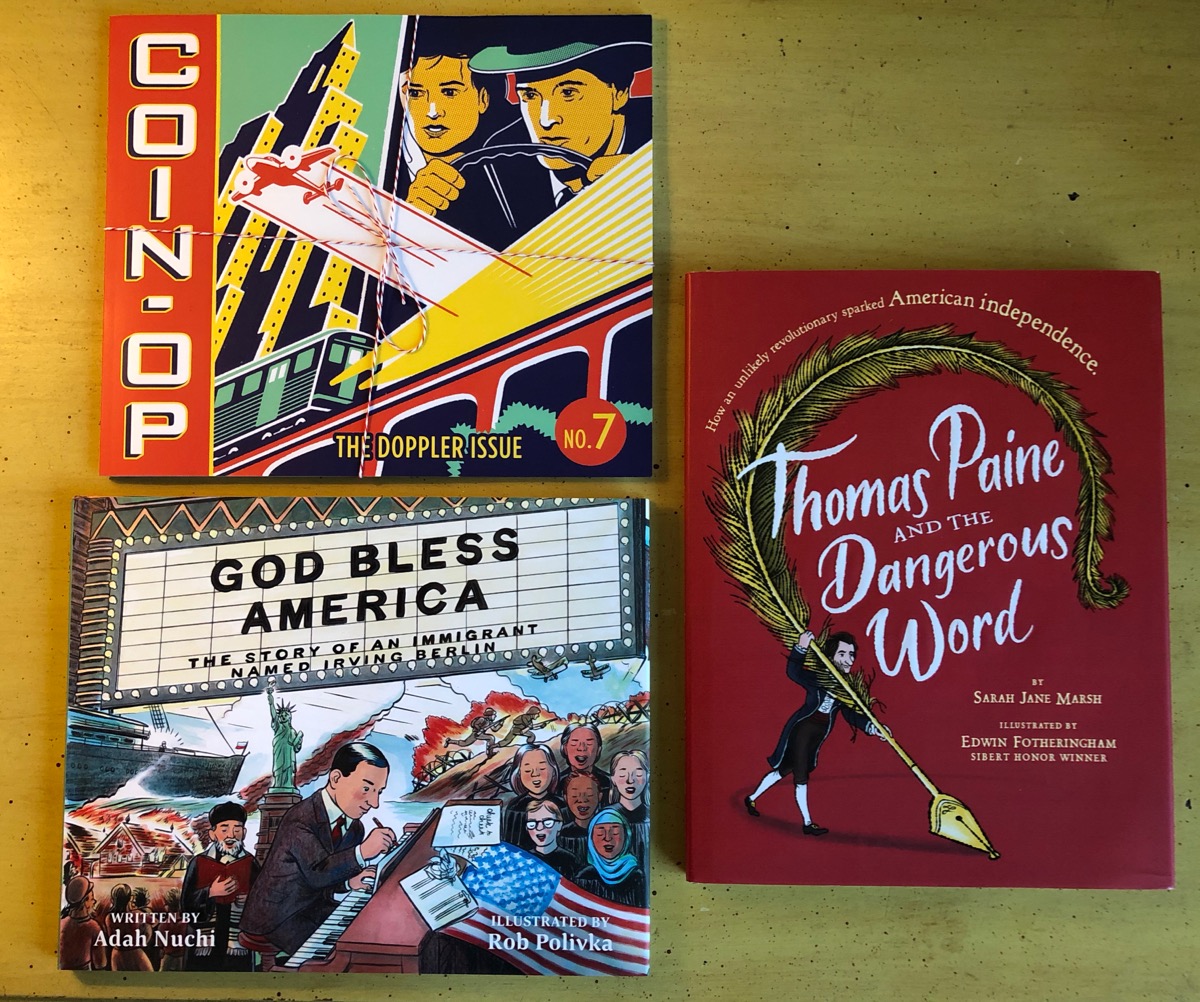Every inmate deserves the right to read
I do not always endorse online petitions unless they have a specific target in mind — an online petition is a great way to tell an elected official that people are paying attention, for instance. But this Daily Kos petition is very important for another reason — it raises awareness of a serious issue that affects a segment of the population that is too often rendered invisible.
The petition is to let New York state know that every inmate in every correctional facility should enjoy the right to read. This is a right that has been under attack too often in recent years, as access to books has been denied by prisons from coast to coast.
In Texas, the Department of Criminal Justice banned 15,000 books from prisons, including books by Alice Walker, John Grisham, Jenna Bush Hager and Bob Dole. However, Texas continued to allow books by Adolf Hitler and David Duke.
In New Jersey, several prisons had banned The New Jim Crow: Mass Incarceration in the Age of Colorblindness, until the ACLU of New Jersey objected.
This is unacceptable. Every American should enjoy access to reading materials — no matter how poor, no matter what they did in their past. Reading helps to create better, more empathetic people. And the minute we deny prisoners' accesss to books, we're admitting that the goal of a prison is not to reform, but merely to lock people away forever. Every prisoner, no matter how heinous their crime, deserves access to books. Sign if you agree.
The voices in your head
Published April 17, 2018, at 11:55am
If you need to remember why you love reading, you need to sit down with this debut novel by a Nigerian author named Akwaeke Emezi.
At Night, Asleep
She comes into our room again,
her first time in weeks.
I hear a small stir on the floor,
the rustle of crumpled paper or a bag.
Last month I would have covered my head
at this noise, groaned in irritation,
but not so today. I lie quiet in hopes
that she complete her first return.On the phone last night, a surprise,
my mom said, Your dad
and I divorced when you were ten.
For two or three years, you didn’t have stable
parents. I was caught up in my head
and couldn’t really be there for you.
Her years-old absence, precise, pristine, still stings me,
though I feel some shame that it does —it’s like being a child again,
though I am all grown.
An aching need for my mother
originated decades ago, landed,
dug a hole, and took root. She was gone.
Sadness grew then, sprouted up and bloomed,
blue and dark, with petals that peeled easily
from the slight stems when I touched them.This was all I knew of growing,
so I tended it
and cultivated a garden
of these flowers, navy-dark, gray-rimmed, the kind
of night in which no stars can be seen
by the eye that searches up for them.
I mistook the sadness for beauty. It was.
I mourned each blue petal that fell.That was a thing, my mother said.
It’s not surprising
that loving causes you worry.
Sometimes sadness seemed the heart of love. Tonight,
though, I lie in wait for her, the cat.
I’m hopeful she’ll come back. With her here,
I’ve learned some joy, how to honor another’s
right to be. So too with my Boo,sound asleep, snoring, not worried
when, or if, she will
return. He settles in his sleep
against my body, his warm skin on my skin,
solid and soft, a quiet promise
that some loves are here to stay. They will.
A small rustle, just a thread, and she jumps
from the wooden floor to the bed.
A book about making a book. And cheddar biscuits.
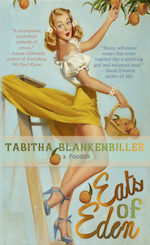
"Pot pie" is a short piece, but toothsome (sorry, couldn't resist). We highly recommend you read it on our sponsorship page, then head out to to Third Place Books Ravenna on April 19 to hear Blankenbiller read and pick up a copy of Eats of Eden for yourself.
Sponsors like Tabitha Blankenbiller are making internet advertising 100% less awful — and supporting your access to book reviews and all the book news you can take. You can make the internet better too: sign up to sponsor a week in June or July.
2018 Pulitzer Prize winners announced
The Pulitzer Prize winners in journalism this year, unsurprisingly, were devoted primarily to the #MeToo movement and coverage of Donald Trump's connection to Russia.
In the arts, the Pulitzer Prizes were awarded to:
The novel Less, by Andrew Sean Greer, which is the very charming story of a writer who embarks on a book tour in order to escape his troubles. (I read and enjoyed Less but did not review it; David Sedaris frequently recommended Less to audiences during his weeklong stand in Seattle this past January.)
The play Cost of Living, by Martyna Majok.
An environmental history of the Gulf of Mexico titled The Gulf: The Making of an American Sea, by Jack E. Davis.
Caroline Fraser's biography Prairie Fires: The American Dreams of Laura Ingalls Wilder.
Frank Bidart's poetry collection Half-light: Collected Poems 1965-2016.
For general nonfiction, James Forman Jr's Locking Up Our Own: Crime and Punishment in Black America.
And last but by no means least, Kendrick Lamar's brilliant album DAMN.
Read more about this year's prizes on the Pulitzer Prize website. Congratulations to all the winners.
Your Week in Readings: The best literary events from April 16th - April 22nd
Monday, April 16: Subcontinental Drift
The local open mic night "celebrating South Asian culture" celebrates spring with new work on the theme "Transitions." Event copy says "Our performers come to a safe-space to share comedy sketches, prose they've written, spoken-word they're inspired by, music they want to perform, and of course, dance." Northwest Film Forum, 1515 12th Ave, subdriftsea@gmail.com, https://www.facebook.com/events/164396617594662/, $10.Tuesday, April 17:
Love and Trouble Reading Seatte Times columnist Nicole Brodeur joins memoirist Claire Dederer in conversation to celebrate the paperback publication of her midlife memoir, Love and Trouble. University Book Store, 4326 University Way N.E., 634-3400, http://www2.bookstore.washington.edu/, 7 pm, free.*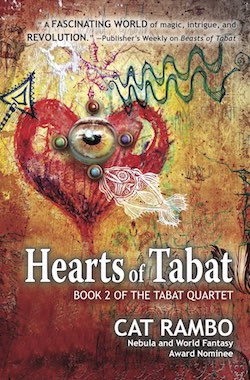
Wednesday, April 18: Sandra O'Dell and Cat Rambo
Two sci-fi authors, Sandra Odell and Cat Rambo, talk about their most recent books. Odell's short story collection is titled Godfall and Other Stories. Rambo is the author of Hearts of Tabat, which is the second book in a series about a city that is going through tremendous societal upheaval..University Book Store, 4326 University Way N.E., 634-3400, http://www2.bookstore.washington.edu/, 7 pm, free.
Thursday, April 19: Dock Street Salon
Two local authors who have published new novels in the last few months, Anca Szilágyi (author of Daughters of the Air) and Ross McMeekin (author of The Hummingbirds), will read and discuss what it's like to publish a new book. Phinney Books, 7405 Greenwood Ave. N, 297-2665, http://phinneybooks.com, 7 pm, free.Friday, April 20: Look Alive Out There Reading
See our Event of the Week column for more details. Elliott Bay Book Company, 1521 10th Ave, 624-6600, http://elliottbaybook.com, 7 pm, free.Saturday, April 21: Cats Vs. Dogs
Seattle Review of Books contributor Ivan Schneider will combat writer Zack Davisson on a topic that has plagued mankind for thousands of years: which is better - dogs or cats? This is a debate and an examination of two of our most-loved mammals. The Grocery, 3001 21st Ave S, 7 pm, $5-20.Sunday, April 22: Poetry y tTaducción: A Bilingual Reading
Poets Eugenia Toledo and Francisco Aragón will read poems in English and Spanish and discuss the pitfalls and pleasures of translation. Open Books, 2414 N. 45th St, 633-0811, http://openpoetrybooks.com, 5 pm, free.Literary Event of the Week: Sloane Crosley at Elliott Bay Book Company
Sloane Crosley's ascent from book publicist to popular literary humorist is well-documented, though it's not exactly unbelievable - if you want to write books, why wouldn't you get a career working with books? But still, her stint as a book publicist is a part of the mythology of Crosley. Can you believe it?, people seem to be asking when they recount Crosley's biography, she went from writing…shudder….press releases to writing comedic essays!
For me, the unbelievable part of Crosley's story came after her first book of essays, I Was Told There'd Be Cake, was published. She ascended from basically an unknown to a literary celebrity overnight. It's as though Crosley effortlessly landed, fully formed, in the pantheon of literary humorists alongside David Sedaris and Dorothy Parker. Her talent didn't seem to require any unfurling or practice runs: immediately, she displayed a real skill for humor. The rhythm and cadence of comedy came naturally for Crosley, and she wrote like she was born to make people laugh.
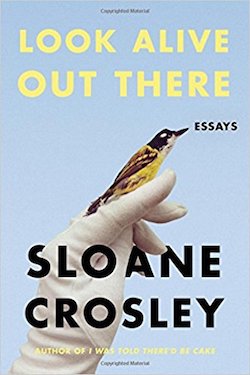
I enjoyed Crosley's first novel, The Clasp, which was a wry and observant study of friendship. But I'm thrilled that her latest book, Look Alive Out There, is a return to the form that made her name - comedic essays. The pieces in this book reflect on the smallest facets of human experience, from the unique challenges of living on top of neighbors in dense urban areas to the expectation of performative do-gooderism when confronted with a moral dilemma in public.
Crosley's gifted at finding the killer line, which perfectly summarizing a situation. Here she is, falling in with friends who are into enneagrams:
One night after work, I go over to their apartment so they can figure out my personality number. This is a fantastically indulgent exercise, like a four-handed massage or group therapy in which only one person's problems are addressed.
Here she is, being sent by a magazine to investigate a chupacabra sighting in Vermont:
I am a less-than-ideal candidate for the job. I don't specialize in mythical-creature hunting or even run-of-the-mill hunting. But the unspoken part of the enterprise is not to find the chupacabra, but to find myself instead, to make a larger point about the power of the imagination, to discover a tick on my shin after traipsing through the woods. Won't that be fun?
This Friday, Crosley debuts Look Alive Out There at Elliott Bay Book Company. She'll be funny and charming and self-deprecating and hearing her read her stories in her own voice will likely make the stories even funnier than they are on paper. You're guaranteed to laugh; she's a natural at this.
Elliott Bay Book Company, 1521 10th Ave, 624-6600, http://elliottbaybook.com, 7 pm, free.
The Sunday Post for April 15, 2018
Each week, the Sunday Post highlights a few articles we enjoyed this week, good for consumption over a cup of coffee (or tea, if that's your pleasure). Settle in for a while; we saved you a seat. You can also look through the archives.
I saw this on an OS map and couldn't not investigate
Knowing the names of things matters. In this charming thread by @gawanmac, naming strengthens and grounds a series of haunting images of the British woods, transforming the merely atmospheric into something much better. The result is what might happen if Instagram merged with Infocom; you wouldn’t think anything good could come of that, but here we are.
I saw this on an OS map and couldn't not investigate. A place of worship symbol in the middle of bloody nowhere on the edge of a wood. It was a foggy, atmospheric day up on the North Downs, so I decided to walk three sides of a square through the wood to reach it. pic.twitter.com/R47CTs9Mg2
— gawanmac (@gawanmac) April 13, 2018
Maybe something
Tamuira Reid’s elegy for her dying father is crushing, but you should read it anyway, even if you have to take multiple runs at it like I did. Because it’s blazingly good writing. Because hard stories told well deserve it.
Because swim meets and tap recitals and science fair projects. Because popcorn in olive oil. Because walks by the ocean. Because you let me put my skates on. Because you didn't spank us even when she wanted you to. Because Neil Diamond said turn on your heartlight. Because what is heartlight? Because I am your daughter. Because you are so thirsty. Because the doctors say no water. Because fluid in your lungs. Because cancer.
(h/t Matt Muir of Imperica’s Web Curios newsletter)
How do we write now
Patricia Lockwood on writing in the time of Trump: halfway between poem and prose, acid and wry, hopeless and hopeful.
The first necessity is to claim the morning, which is mine. If I look at a phone first thing the phone becomes my brain for the day. If I don’t look out a window right away the day will be windowless, it will be like one of those dreams where you crawl into a series of smaller and smaller boxes, or like an escape room that contains everyone and that you’ll pay twelve hours of your life for. If I open up Twitter and the first thing I see is the president’s weird bunched ass above a sand dune as he swings a golf club I am doomed. The ass will take up residence in my mind. It will install a gold toilet there. It will turn on shark week as foreplay and then cheat on its wife.
English will come out of it wrong, and then English will come wrong out of me.
(Did you notice this line — “learn the names of trees”? If you skipped the first piece in today’s Post, go back to it now. That’s why.)
The Silence
Junot Díaz has in some sense been writing about being raped as a young boy since his first published story. But this widely shared New Yorker essay is his first open statement — an accounting and an apology, in an epistolary form that creates a private space on a very public page.
I know this is years too late, but I’m sorry I didn’t answer you. I’m sorry I didn’t tell you the truth. I’m sorry for you, and I’m sorry for me. We both could have used that truth, I’m thinking. It could have saved me (and maybe you) from so much. But I was afraid. I’m still afraid—my fear like continents and the ocean between—but I’m going to speak anyway, because, as Audre Lorde has taught us, my silence will not protect me.
X —
Yes, it happened to me.
Whatcha Reading, Ivan Schneider?
Every week we ask an interesting figure what they're digging into. Have ideas who we should reach out to? Let it fly: info@seattlereviewofbooks.com. Want to read more? Check out the archives.
Ivan Schneider is a writer, critic (you may have read him on this very site), and theorist on animals in historic literature. As he mentions below, he is appearing next Saturday at The Academy of Reason & Wonder in a face-off titled "CATS vs. DOGS". The physical experience, at The Grocery has sold out, but you can always tune in on the Facebook livestream.
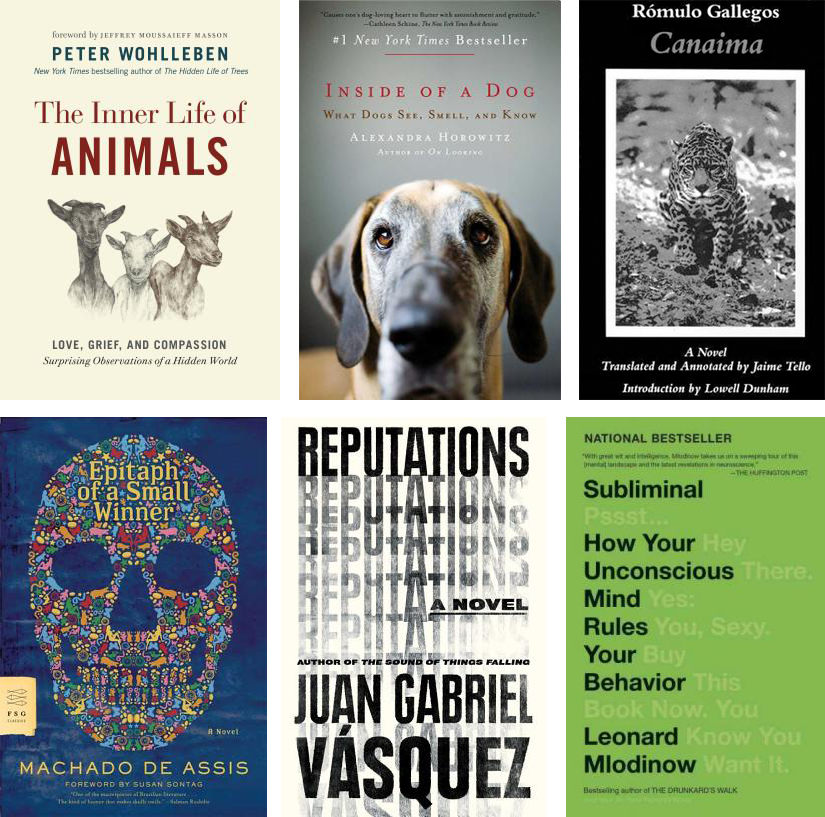
What are you reading now?
In preparation for a “CATS vs. DOGS” talk that I’m co-hosting next Saturday at The Academy of Reason & Wonder (sold out, watch the livestream here), I’m re-reading a few of the talking-dog stories that most inspired me: “Diary of a Madman” by Nikolai Gogol, “Investigations of a Dog” by Franz Kafka, and “The Dogs’ Colloquy” by Cervantes.
Questions about real dogs may also come up, and so I’m reading The Inner Life of Animals by Peter Wohlleben (author of The Hidden Life of Trees), and the bookstore pet-shelf perennial Inside of a Dog by Alexandra Horowitz.
I am also finding other talking-dog stories by following the trail within Nisi Shawl’s recent column about dogs in SFFH. I read with glee her remarkable short story “Black Betty,” which to my knowledge is the first talking-dog story that brings to the forefront the racially-coded aspects of the dog’s spoken dialect (rather than the fact that it speaks at all).
Caroline didn’t like the way Betty talked. “Where’d you get her voice box, anyway, Dad?” she asked Greg. “Did you buy it off some homie on the corner?”
…
It took a while till Betty understood the problem. Race had never been an issue before. She had heard the Fraziers discussing white people, of course, but like any other dog, talking or non, her sense of color just wasn’t that strong.
Gradually she came to realize that what she was dealing with were sort of like super-packs. Though there were several of them, her dilemma involved only two. The Fraziers belonged to the one which called itself black; it was small and not all that powerful compared to some others. The Dunnetts were what was known as white. And apparently — because of her markings? — they’d accepted Betty as part of their super-pack, believing she was a white as well.
Until she talked.
What did you read last?
Canaima by Rómulo Gallegos (1884-1969). This 1935 novel is an adventure story about a young man who seeks his fortune in the Venezuelan jungles. Along the way we learn about the workings of the merchant class, the corrupt politicians and police, blood feuds, the exploitation of gold miners and rubber-gum extractors, and the destruction of the native peoples.
For four months in 1948, Gallegos was president of Venezuela. A military coup sent him into a decade of exile, after which he returned to Venezuela where he was named Senator for Life. His legacy includes the biannual Rómulo Gallegos International Novel Prize, which comes with a €100,000 cash prize. Last year’s award was postponed due to Venezuela’s continuing economic crisis; and it may or may not be held again in August 2018.
This reading is part of a larger project, as I’m not just randomly pulling books off the shelf.
By way of background: I’m learning Spanish, as is the patriotic duty of every American. Or if that’s too much for you, it’s the basic civility of a good neighbor.
As I’m probably a few years away from being able to comfortably read a novel in Spanish, I’m working through a list of translated works by Gallegos, Jorge Luis Borges, Alejo Carpentier, Julio Cortázar, Gabriel García Márquez, and others referenced in the essay collection The Great Latin American Novel by Carlos Fuentes.
I already consider this project to be a tremendous success, as Fuentes has led me to Epitaph of a Small Winner (1881) by the Brazilian writer Machado de Assis (1839-1908), who shares with Gogol a deep fascination with the nose:
Did you ever ponder the function of the nose, beloved reader? The explanation proffered by Dr. Pangloss is that noses were created to support spectacles, and I confess that for a time I found this theory satisfactory; but one day, while I was meditating this and other obscure points of philosophy, I hit upon the true, authentic explanation.
Indeed, I had merely to remember the custom of the fakirs. The reader doubtless knows that a fakir will spend long hours looking at the tip of his nose, with the sole purpose of seeing the divine light. When he fixes his eyes on the tip of his nose, he loses the sense of external things, creates within his mind a beautiful image of himself, grasps the intangible, shakes off his earthly shackles, dissolves himself, and becomes etherealized. This sublimation of one’s being, via the tip of the nose, is one of the most lofty phenomena of the spirit, and the faculty of achieving it is by no means confined to fakirs; it is universal. Every man has the need and the ability to contemplate his own nose, in order to see the divine light, and such contemplation, resulting in the subordination of the universe to one nose, establishes social equilibrium. If noses contemplated only each other, the human race would not last two centuries; indeed, it would not have survived the most primitive tribes.
…
The conclusion, therefore, is that there are two major forces in society: love, which multiplies the species, and the nose, which subordinates it to the individual. Procreation, equilibrium.
(translation by William L. Grossman, Noonday Press, New York 1952)
Because I will now have to read everything ever written by Machado de Assis, I will soon have to abandon my studies in Spanish so that I may take up Portuguese. In that sense, my current project is already a tremendous failure.
What are you reading next?
Reputations by Juan Gabriel Vásquez.
I first read Vásquez when reviewing Lunatics, Lovers, and Poets for the Seattle Review of Books. I’ve kept up with a few of the authors in that collection, such as with Valeria Luiselli’s unforgettable Tell Me How It Ends and Yuri Herrera’s Signs Preceding the End of the World.
Subliminal: How Your Unconscious Mind Rules Your Behavior by Leonard Mlodinow.
I was intrigued by the podcast of Mlodinow’s talk at Town Hall on his new book Elastic: Flexible Thinking in a Time of Change. Then I found his earlier book, Subliminal, at Mercer Street Used Books, and bought it for the cover alone. Mlodinow has been added to my science reading list, but that’s a story for another time.
Aaron Bagley's Dream Comics: Livin' the dream
There's nothing more boring than hearing someone else's dreams — unless that someone is Aaron Bagley. Every week we publish his Dream Comics, a glimpse into the shadows of one man's sleeping mind: sometimes sublime, sometimes silly, sometimes frightening. They're great visual storytelling — just this side of "wtf," like any decent dream.
Here are a few of our favorites.
The one about the whales.
The one about the whole, entire tree.
The one that maybe happened in a local bookstore, except it's a dream.
The one about flying with umbrellas.
The one where a cat is a clock.
And if you're into process stuff, you should follow Aaron on Instagram, where he posts all sorts of delightful sketches and commentary on craft — sometimes with his alternate paw.
The Help Desk: Putting the "man" in "romance"
Cienna Madrid is taking the week off. Please enjoy this encore Help Desk from September, 2015. Do you need a book recommendation to send your worst cousin on her birthday? Is it okay to read erotica on public transit? Cienna can help. Send your questions to advice@seattlereviewofbooks.com.
Dear Cienna,
In the military I was taught to keep it high and tight—that's my hair, of course, but also a good attitude towards life. Efficient, controlled, prepared, and to the point. But, it turns out, I have a certain softness for rich Victorian fiction that curls in on itself and never leaves any aside unsaid. Middlemarch has stolen my heart. Jane Austen makes me giggle. Cienna, I'm a man's man. I should be reading spy novels and hard stuff. What is it about those books? What the hell is wrong with me?
Burt in Burien
Dear Burt,
No one is asking you to make your own beef jerky out of old cow parts, ejaculate on a pile of fawning virgins, or any other questionable chores ascribed to the elusive “man’s man.” There’s no conflict with loving military precision and efficiency, and enjoying romance novels. In fact, the two are very complementary.
A good romance novel allows you to suspend logic and control for a few hours and be swept up in an emotional story that manages to be dramatic through its inevitable happy ending. We all want happy endings; that’s the allure of the genre. And massage.
In fact, last month, after a particularly bad date that took place at a supermarket cheese counter – where I ingested an hour’s worth of free cubes while chanting, “My God, Cienna, which vindictive crone did you offend to deserve this romantic hellscape?” – I curled up with a Tillamook baby loaf and a feminist romance novel and read until I believed in the concept of romance again (the lurid sex scenes that somehow never include the word “penis” helped).
There is nothing wrong with you. I suspect your military buddies could say that you have shitty taste in books but it would be a pity to deny them that – one of life’s sweetest pleasures is judging other people’s reading lists. Plus, it’s not like you’re carrying around a signed copy of Left Behind.
I suggest you join a book club filled with people (most likely women) who will be thrilled to discuss Victorian bodice-rippers with you and very impressed by how poetically you can describe a penis and breasts without ever using the word “penis” and “breasts.” Or, if you’re not quite ready to be out-and-proud about your taste in books, at least consider these feminist historical romance writers: Courtney Milan, Cecelia Grant and Sarah MacLean. I bet you’ll enjoy them.
Kisses,
Cienna
Portrait Gallery: Only Child
Each week, Christine Larsen creates a new portrait of an author for us. Have any favorites you’d love to see immortalized? Let us know
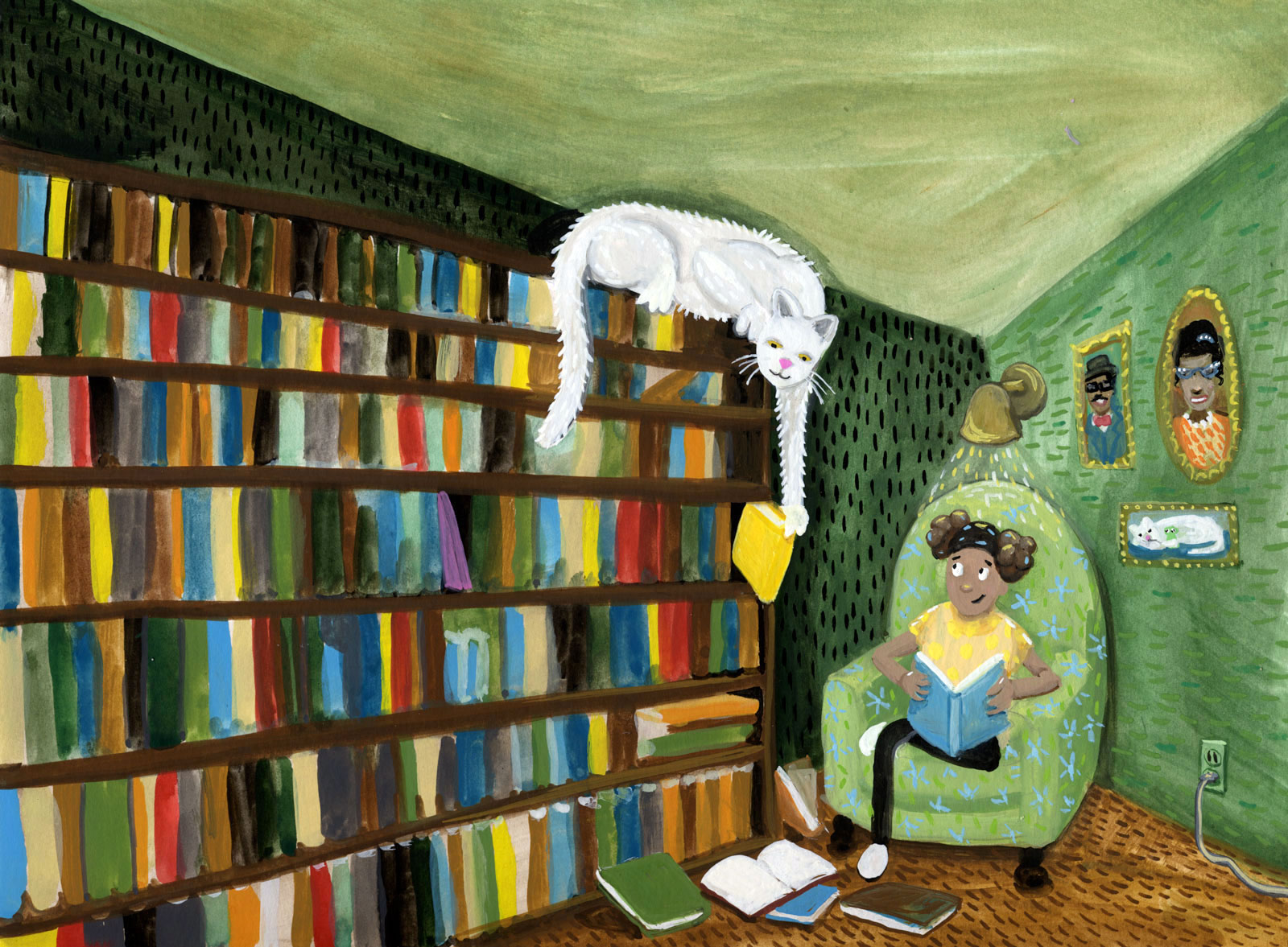
National Only Child Day
Today is National Only Child Day. Celebrate all the joys of being a one-and-only in the way that only you can.
Future Alternative Past: drugs
Every month, Nisi Shawl presents us with news and updates from her perch overlooking the world of science-fiction, fantasy, and horror. You can also look through the archives of the column.
Purple Haze
Drugs are good. Well, maybe not all drugs. But as a whole, as a group, they’re meant to help. And usually they do.
In SFFH, better living through chemistry is brought about most famously by the “spice” melange, a drug absolutely essential to navigators steering around interstellar trading ships. Frank Herbert’s influential 1965 novel Dune focuses on the fortunes of those who own the planet Arrakis (melange’s sole source), but there are also memorable portrayals of the blue-eyed, spice-addicted members of the interstellar Pilots Guild and the secretive “Bene Gesserit” cult, and Arrakeen natives.
Of relevant recent science fiction titles the best is Autonomous by Annalee Newitz. Her heroine, Jack, fabricates bargain-priced pharmaceuticals that buyers around the world dose themselves with for effects ranging from hangover-less partying to long, productive workdays.
Perhaps it’s authors’ need for conflict that causes us to concentrate on drugs’ negative effects. Even melange, in its creator’s mind so beneficial, so widely accepted, is also imagined as addictive. The “herbal” preparations imbibed by sword-and-sorcery’s favorite freak, Michael Moorcock’s cursed hero Elric of Melnibone, are also de facto addictive: without them he would die.
From good drugs that do bad things it’s a short step to plain old pure evil. The soma of Aldous Huxley’s Brave New World is the archetypal chemical oppression-enabler. Rendering the masses calm and mildly euphoric, self-administered soma greatly aids the maintenance of the novel’s global dystopia. There are scores of compounds with similar functions in later SFFH, such as the protein shakes consumed by slaughterhouse workers in Vandana Singh’s “Are You Sannata 3159?” (appearing in a collection reviewed below).
Often SFFH merely slaps a weird new name on an already existing drug. This is known in the trade as "calling a rabbit a smeerp,” and it’s annoying as fuck. Cute substitutes for the word coffee such as “klah,” “gvi,” or “caf,” don’t prove that readers have been transported to another realm. They prove that they’re in thrall to a short-cutting writer. Far more interesting are the stories casting aside well-worn tropes, as John Crowley does in Engine Summer, when his protagonist tokes up daily on pipes full of St. Bea’s Bread which is...not a drug.
Sometimes fantastical pharmaceuticals advance the plot, but don’t diverge much from the drugs we know; in her near-future novel Slow River, for example, Nicola Griffith’s heroine Lore may as well be ingesting heroine or meth or cocaine as the nameless drug that gets her through weeks of sex work. Sometimes they’re a collage of the traits of more familiar substances, like athelas or kingsfoil, the healing herb Aragorn uses in J.R.R. Tolkien’s The Fellowship of the Ring (partaking of several characteristics of mints and basil). Sometimes, in some skiffy stories, future drugs are identical with currently available ones, but they’re produced differently — manufactured in a vacuum or a zero-g environment, or grown in moss or duckweed, or in genetically-engineered milk animals. Which is where SFFH leaves off and reality takes over. Because these methods are being used right now.
Recent books recently read
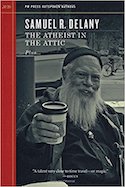
Samuel R. Delany is one of the baddest of literary badasses. In 1962, at the ripe age of 20, he published his first novel, The Jewels of Aptor, and went on to win a slew of Hugos, Nebulas, and other major awards. Now he’s 76, and the latest entry in his decades-long career is The Atheist in the Attic, a collection from PM Press’s “Outspoken Authors” series. The title story posits secret encounters between Leibniz and Spinoza in historical Amsterdam — nothing sfnal here, but the novella’s Delanyesque explorations of meaning, mood, intention, and imagination are as delectable as any in his genre fiction, and as rich in the cognitive estrangement SFFH readers prize. It’s followed by “Racism and Science Fiction,” the influential 1998 essay which led to the founding of the Carl Brandon Society and which, sadly, proved all too accurate in its prediction of racist reactions to a growing nonwhite presence in the field. A brief interview conducted by Terry Bisson concludes this slim but essential book.
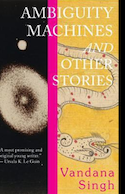
Another collection, Vandana Singh’s Ambiguity Machines and Other Stories (Small Beer) showcases a bit of what we’re fighting for. It’s a xenophile’s treasury of nonstandard plots, unfamiliar and finely crafted characters, and new ways to embrace the wonders of the universe, with particular attention paid to their scientific bases (Singh is a physics professor). My personal favorites are “Cry of the Kharchal,” a short story about birdwatching, time-traveling ghosts, and blocked poets; and a novella original to this publication, “Requiem.” Though the latter’s premise — a young woman seeks answers in the mysterious death of her aunt — provokes boredom by its mere mention, the actual story falls into none of the time-worn trope-traps you’d expect and delivered me, by its end, into a harsh but hopeful landscape.
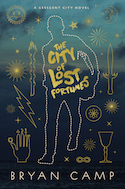
Bryan Camp’s debut, The City of Lost Fortunes, (Houghton Mifflin Harcourt) was written in the back of a car escaping the ravages of Hurricane Katrina. It’s a novel haunted by New Orleans’ near-death experience. Filled with supernatural extensions of the cultural diversity the city’s famed for, Lost Fortunes introduces readers to Jude Dubuisson, a racially ambiguous demigod who’s tired of his divine powers. Dubuisson gets drawn into a rigged card game everyone tells him he can’t win, but since they expect him to play fair they’re in for a surprise. Camp clearly cares for the Crescent City’s soul, and he brings its scenes to sweltering life: the cafés, cemeteries, flood-damaged ruins, low-life bars, botanicas, pelican-skimmed causeways, diners, guard dogs, festivals — a phantasmagoric panorama of a true urban fantasy.
Couple of upcoming cons
Once again I recommend attending WisCon. It’s a favorite both of mine and my mom’s: chock full of decadence, wit, and glitter-laden feminazgûls. There’s a transgressive rave, childcare, a quiet room for sufferers of sensory overload, and a bake sale. This year’s Guests of Honor, the indomitable Tananarive Due and the intrepid Saladin Ahmed, will give their rousing keynote speeches over a feast of meringues, brownies, mousses, and other sweets. Come. Partake. If you can’t save the world with chocolate chip cookies, it’s not worth saving.
Or perhaps you’d rather not make a trek to the Midwest during the humid warmth of May (WisCon’s held in Madison, Wisconsin). If so, try BayCon, just down the coast, ten minutes from Frisco. This year the theme is Patchwork Fandom: Stitching the Generations Together (appropriate, given recent kerfuffles over congoing fandom’s alleged ageism). Guests of Honor include our local Girl Genius, Margaret Organ-Kean, artist and Magic the Gathering card illustrator extraordinaire.
Thursday Comics Hangover: The unexpected terror of Josh Simmons
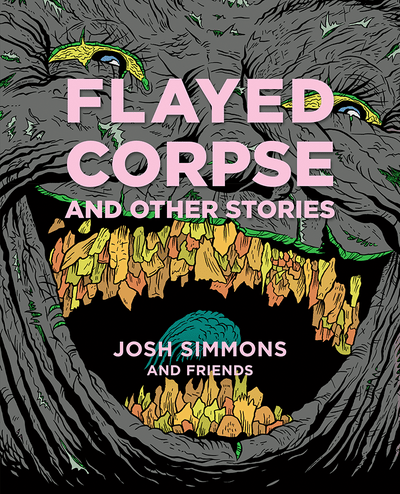
Josh Simmons is continuing a proud comics tradition of grossing people the fuck out using graphic violence and inappropriate humor. His books read like modernized, literary versions of those schlocky old EC Comics that came out back before the Comics Code Authority turned the freewheeling world of comic books into squaresville.
This Saturday at the Fantagraphics Bookstore and Gallery, Simmons will be onhand to present his latest book, Flayed Corpse, which is a kind of one-man anthology written by Simmons and drawn by a passel of artists. (It's fitting that the book is launching in Seattle, since Corpse is a book with deep Seattle roots, too: artists include Seattleites like Eroyn Franklin, Ben Horak, Tom Van Deusen, Pat Moriarty, and Fantagraphics editor Eric Reynolds.)
It probably goes without saying, but this book isn't for everyone. In the second story, a slasher stalks a pair of nubile young women. "…I'm in need of a sweet, slow sexin'," one of the women announces while in the hot tub. "I could go for a slice of the ol' dick myself," the other replies. The story ends with an explicit, gory sex scene that would probably get the book banned in Alabama if a library mishap resulted in a copy of Flayed Corpse winding up in the wrong kids' hands.
But Corpse doesn't feel like a book that's out to get banned for the sake of cheap publicity. Simmons's intent is different than the intended-to-shock vibe of, say, a Johnny Ryan comic. He's genuinely interested in the vocabulary and cadence of horror comics - stretching out a tense scene using longer panels, or a spray of tiny panels to build up suspense, even while the plots of the stories resist the many clichés of the genre. There's no violence in the story by Simmons and Franklin - it's a literal day at the beach - but it's a genuinely unsettling tale in which the threat of violence is palpable in every day-glo panel.
Not every story is a horror show; some are quite amusing. In "Late for the Show," Simmons and Van Deusen draw an enormous manchild going on a cop-killing rampage on what appears to be the Boren overpass. In "The Great Shitter," Moriarty and Simmons tell the story of a giant Godzilla-like creature that eternally eats and shits onto a small town that devotes generations to feces removal. "The shit is pushed out to the river, where it washes away. We all keep our heads above the shit flow and live to work the shit show another day." It's an allegory for jobs like fracking and coal mining that destroy the environment, sure, but it's also a funny story about monsters and poo.
Like the best anthologies, Corpse is interested in keeping you on edge, never quite sure of what's coming next. Hell, don't tell DC Comics, but Simmons seems to have snuck an actual Batman story into the book, somehow. Even just calling it a horror collection is doing it a disservice: Simmons understands that to scare a reader, you can't keep sending unrelenting darkness into faces for a couple hundred pages. True terror happens when you don't know what's going to happen next.
"...the goddamn Great American Landscaping Novel"
Published April 11, 2018, at 12:01pm
Bainbridge Island author Jonathan Evison's latest novel is a book that draws a line in the class war and lands squarely on the side of America's blue-collar workers.
Get excited for Independent Bookstore Day with Page 2 Books and the Neverending Bookshop
The last Saturday in this month, April 28th, is Independent Bookstore Day - a celebration of books and the small businesses that celebrate literary culture year round. We'll have a lot to say about Independent Bookstore Day over the course of the month, but we thought we'd begin the conversation by talking with two owners of smaller local bookstores - Jenny Cole of Burien's Page 2 Books, and Annie Carl of Bothell's Neverending Bookshop - about their plans for the day, what they've been reading, and why independent bookselling is so important to them.
Jenny Cole, Page 2 Books
Do you have anything special planned for Independent Bookstore Day?
We do. We always like to have authors come in the store, so that day we have three different authors.
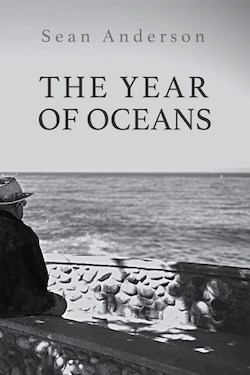
We've got Sean Anderson, who wrote The Year of Oceans. He's at 11:00. Stella Cameron will be here with her new book, Whisper the Dead, and Ambrose Stolliker with his book, Old Hollow.
And are those reading, or signings, or are they both?
They're signings, and they'll be working here in the store. Generally what we do - it's my favorite way to authors in - we just have a table set up with their books and information about them, and then they wander around and talk to customers about what they're reading, and about their books. It's just very relaxed, informal.
We will also have lots of giveaways that day. We've got a couple of tables set up with [advance reader copies], as well as book bags, books that we're giving away, some merchandise. So everybody that comes in and shops here will get a little something to take home with them.
What's a book you've read recently that you've loved?
The 57 Bus by Dashka Slater is one that I absolutely love. It's a true story - young adult. Our book club read it, and I think everybody in the book club really enjoyed it. It's kind of a shocking book in what it deals with, but it's so well written. It's been winning lots of awards.
Why do independent bookstores matter to you?
I think it's very important. We had somebody place an order the other day - she lives in Illinois, and called our store because she was getting a book for her granddaughter who lives here.
And she sent a note shortly after placing the order saying, "these are the reasons why I love shopping independent." She called in the order, she got the book that she wanted, we wrapped it for her, we talked to her about the purchase. It was more than pressing a button on a computer or calling a big warehouse where maybe the person that answers the phone doesn't read or doesn't know about the books.
I just think the experience that people have is so different in an independent book store - as it is for any small business. I love to frequent small businesses because you get the personal experience.
Annie Carl, The Neverending Bookshop
Do you have anything special planned for Independent Bookstore Day?
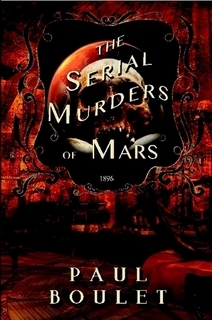
Since the shop is so small, doing like really big activities is not much of an option, so instead I've got authors lined up pretty much all day; Laurie Thompson, who's a children's book author, will be there from ten to noon; and then Paul Boulet who self-published his book The Serial Murders of Mars, will be there noon to two. Jeff J. Peters - who wrote Cathadeus, which is a fantasy novel - he'll be there two to four; and then my friend Rachel who is a self-published author also is going to be there four to six. She'll basically help us close up the day.
And then in addition to that, we're going to be stamping passports, ringing books, and we're going to have book trivia again this year. That's the one activity we had last year, and it went really, really well. We have prizes - posters, advance reader's copies, other bookish swag for Indie Bookstore Day.
What's a book you've read recently that you've loved?
I'm currently in the middle of In The Country by Mia Alvar. It's short stories about the Philippines. But before that I read a book called Fat: The Anthropology of an Obsession, and it's thirteen essays about what being fat means around the world. Twelve anthropologists and one fat activist - as she proclaims herself to be - wrote essays for the book, and it's stunning. It totally put my body image issues, and our current cultural body image issues, in perspective. And it's kind of outside of what I usually read; I usually read science fiction, fantasy, and lots of young adult and children's books. So this was kind of something new for me and I really, really enjoyed it.
Why do independent bookstores matter to you?
I've always been an independent bookseller. I started working as a bookseller when I was fifteen and I just - boy, it's such a loaded question and it's such an easy question and such a hard question all kind of wrapped into one.
Indie Bookstore Day for me is just a major celebration of bookstores and all of the marvelous things that we stand for -promoting free thought, promoting new ideas, promoting banned books, fighting censorship, promoting all of these different authors who maybe wouldn't have a platform if we weren't available to give them that platform.
Indie bookstores are still well-known for promoting our local community. I'm the only bookstore in a two- or three-mile radius, and so I have a solid customer base of people that can walk to my shop. They're families that walk down to the bookstore, and to the cafe to get some coffee, and that's what community bookstores are.
Those dollars that come into the shop go directly towards feeding my family and my child, and they also go toward the education process that we do at the store. We help people talk about why books are important to them - even if it's a science fiction novel or a fantasy novel, or a romance novel, it brings new ideas to them. It's more important to have a free-thinking society now more than ever, and I think indie book stores help keep our nation and our world free-thinking.
For me, being an indie bookseller and running an indie bookstore is really important to make sure that everyone has a chance to present their thoughts and ideas. Whether it's self-published or traditionally published, or whether you're coming into a bookstore and picking up a book you didn't think you were gonna read before - that's what I exist for.
Win a free pair of tickets to see Lindy West read at Benaroya Hall this Sunday
As you've already seen from this week's sponsorship, Lindy West is giving a talk about witch hunts and feminism this Sunday night at Benaroya Hall. If you're planning to attend but you haven't purchased tickets yet, I have some good news for you — your procrastiation has finally paid off!
We're giving away a few pairs of tickets to Sunday night's show, and all you have to do to enter the drawing is retweet this here tweet by 5 pm today:
Retweet this tweet by 5 pm for a chance to win a pair of tickets to see Lindy West read at Benaroya Hall this Sunday night! More information about the reading here: https://t.co/Zx2i028g4Y pic.twitter.com/uqBujotuF5
— The Seattle Review of Books (@seattlereviewof) April 11, 2018
That's it! Just a retweet. Don't have a Twitter account, you say? Just join Twitter with a throwaway account and retweet the dang thing to your zero followers. It's free!
The American Library Association's annual report The State of America's Libraries 2018 is now available to read online and in downloadable PDF form. In it, you'll find lists of the year's most frequently challenged books, trending topics in library science, and likely areas of growth for the year ahead. It's an important resource, and it's absolutely free.
Take this sentence, for example
Published April 10, 2018, at 12:01pm
Jez Burrows created a book of stories made up of example sentences from dictionaries, and in doing so, created a new form of wordplay and entertainment.
